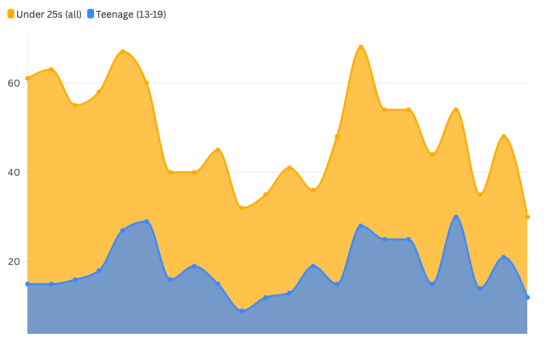To borrow a phrase from the jargonistic patois of marketing – Ripperology has a brand identity problem.
This niche, predominantly male, community is a broad church. The label ‘Ripperologist’ groups together anyone with an interest in studying Jack the Ripper and the gruesome campaign of butchery that shrouded the cobbled streets of Whitechapel in terror 130 years ago.
Recently, though, this title has come to resemble more closely a target painted on one’s back.
Every time that notorious headline-making moniker hits the pages of national newspapers, ripperologists come under attack. They are vilified as misogynistic deviants, exhibiting a morbid obsession with the unknown killer and glorifying his crimes.
But do we really know who, or what, we’re criticising? Is there any truth in these accusations? And why do we never hear from this community itself?
Two developments this year have seen ripperologists charged with failing to show respect for the lives of the victims.
Beyond The Streets, a sex worker charity in East London, launched their ‘Alternative Jack the Ripper tour’ at the start of 2018, aiming to ‘create a new narrative’ and tell the ‘untold stories’ of the victims. In a similar vein, historian Hallie Rubenhold announced her latest book ‘The Five: The Untold Stories of Jack the Ripper’s Victims’, set for release in March.
Speaking to a group of seven ripperologists via Skype, they were quick to reject this criticism.
“When people say we don’t focus on the victims it’s important to realise that in 130 years the only people who have taken any interest in the victims are ripperologists. Nobody else has found out anything else at all and nobody else cared”, said Paul Begg, one of the UK’s most respected ripperologists.
This view was seconded by American author Tom Wescott, who has written two highly acclaimed books on the case: ‘The Bank Holiday Murders’ and ‘Ripper Confidential’. He said: “The irony is that the only people who really move past the sensationalism are the ripperologists and yet we catch the flack for it. Any tour that is talking about the lives of the victims is drawing their information from material produced by genuine ripperologists.
“During the media blitz of a new book it’s all sensationalism and gore. That enrages whoever is looking for a reason to be angry, so they attack Ripperology because they don’t understand that we’re separate from those things as a community.”
Rippercast – a podcast with 160 episodes over 10 years – pays testament to the consideration this community places on the victims’ lives.
During its first two years, the podcast covered all the canonical victims – the five women generally accepted as victims, as well as the non-canonical ones – over ten hypothesised further victims. A two-part episode focusing on ‘the most mysterious of the victims’, Mary Jane Kelly, runs to over four hours.
“One of the standards the podcast set itself from the beginning is to treat the women with the utmost respect while still being honest about their lives. If anyone listens to an episode of the show there’s an obvious high level of taste and respect that our guests bring to the topic,” said host Jonathan Menges.
One of the major frustrations for ripperologists – who devote huge amounts of time to meticulous research – is a lack of control over their reputation.
They are unfairly tarred by the same brush as genuinely exploitative elements of the so-called ‘Ripper Industry’ that range from big buck Hollywood films to a novelty brand of toilet spray.
Ally Ryder is the administrator of Casebook.org, the world’s biggest Jack the Ripper resource and forum. She likened the distinction between Ripperology and sensationalist representations of the myth to the difference between paleontologists who study dinosaur bones and the science of Jurassic Park.
She added: “I can’t think of another area of legitimate academic study that is so completely trivialised in the media. The movies are all about – let’s see the woman in the low cut bodice dying gruesomely with the top-hatted killer in the swirling london fog. We don’t have any control over that and yet that is the image used to reflect us.”
Some blame may lie at the feet of publishers. Previously, there has been little interest in any books other than those offering the titillating ending of an identified suspect.
Ally believes publication of Hallie Rubenhold’s new book is a ‘product of the current times’. Cynics might take note of its publication date of 8 March 2019 – international women’s day.
She said: “It’s partially the timing, what with #MeToo and the feminist wave. 20 years ago it wouldn’t have been considered. There’s more of a push now to include female perspectives in historical work – reworking how we previously saw history only through the eyes of men.”
Welsh Ripperologist Jon Rees said: “Ripperologists have been looking at the victims but it hasn’t been published in the mainstream. This isn’t the fault of ripperology, it’s the publishing industry. They wanted books about who the ripper was rather than who the victims were.”
In August, a service was held in St. Bride’s church, Fleet Street, for Mary Ann Nichols, the first of the five canonical victims. At this service, as well as in advertisements for the ‘Alternative’ Ripper tour, photographs of the victims in life – long proved false by ripperologists – were used.
Whilst undeniably well-intentioned, this was viewed as profoundly ironic, not to mention hypocritical.
Paul Begg, whose numerous books include ‘The Complete Jack the Ripper A-Z’, said: “It’s hypocritical. Ripperologists have tried valiantly to be accurate in what they are doing but this to me was deeply offensive.
“If I had just died and you were going to hold a service to remember me by, I wouldn’t want a photograph of someone else put up in the church and have people weeping over the loss of somebody else.”
This is undoubtedly a result of ignorance; the consequences of an unverified google image search. Yet significantly, it speaks for a lack of engagement with the ripperologist community.
Jonathan Menges said: “I think it’s a good idea in theory- a welcome addition to the field. But we are disappointed that they choose to use photographs purporting to be the victims from life when they’re not. That to me shows an insensitivity to the real victims of this murderer.”
Similarly, ripperologists condemned the intentional ‘prettying up’ of victims’ lives as ‘disrespectful to their memories’ – referring to recent claims that some weren’t prostitutes, contradicting the long-held belief in this based upon documentary evidence.
Jack the Ripper’s identity has eluded discovery for 130 years. Over the years an extensive lineup of suspects have found themselves in the metaphorical dock, ranging from the prince who would later be crowned King Edward VII, to an American ‘quack’ doctor and even a female suspect – ‘Jill the Ripper.’
Ripperologists acknowledge the importance of respecting the victims, but equally challenge the idea of not working to establish the killer’s identity – a measure of justice in itself.
Tom Wescott said: “Absolutely we focus on the killer. When it comes to each of the victims we know the moment, the date, the minute their story ended. With the killer we do not have that piece. If your only question was who are these women and how did they live, you’re going to learn that with one or two trips to the library.
“The greater question is who killed them and why. That is inevitably going to be the focus and there’s nothing anti-feminist about that.”
For Trevor Bond, co-author of ‘The A-Z of Victorian Crime’ and Ripper tour guide, the only solution is to deal with ethical questions on a personal basis.
He said: “What we’re dealing with is the tip of the iceberg- what gets in the papers is often suspect-focused and gory. It doesn’t reflect the depth of research that is going on beneath the waterline. The general public don’t see this, so they judge the field by what they see.
“To lump everyone in together and say ripperologists are all gore-obsessed and don’t care about the facts of the victims lives is unfair.
“All any individual can do is seriously look at the way they approach it. We haven’t got a code of ethics but we have to ask whether I’m doing this in a way I’m comfortable with. As a tour guide that’s something myself and my colleagues spend a lot of time thinking about.”
Featured image courtesy Rob Unreal via Flickr




